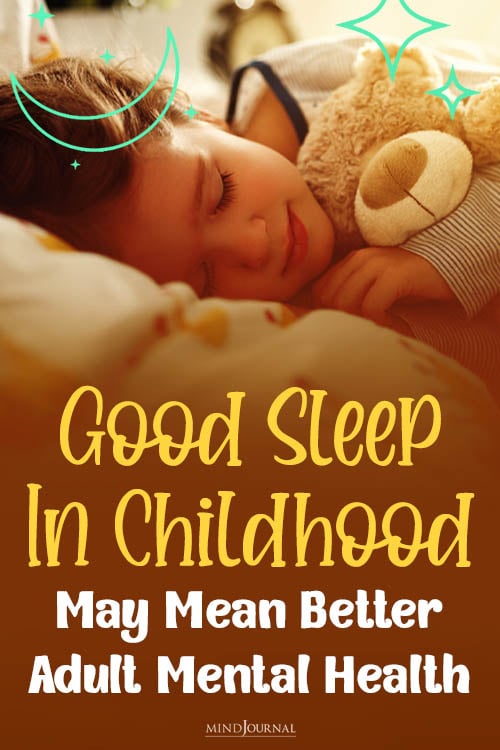Did you get good sleep as a child? If so, it might be shaping your mental health today. Let’s learn how high quality sleep is the key to well-being.
Longer, higher quality, and more regular sleep leads to better mental health.
Key points
- Regular, high quality sleep is important for children’s health and well-being.
- Better sleep has been related to better outcomes including school performance and fewer behavior problems.
- Longitudinal studies to determine lasting effects of childhood sleep are rare.
- This study shows that better sleep at age 9 led to fewer problems at age 18.

Understanding changes that occur during childhood and adolescence is a primary goal of developmental psychology and is of great interest to parents, healthcare providers, educators, and researchers. Also of great interest is understanding what circumstances, experiences, and behaviors in childhood and adolescence are related to better and worse outcomes later in life.
One of the important research strategies to understand how changes over time are related to outcomes of interest is to conduct longitudinal studies.
Observing and measuring behaviors of individuals at different time points can generate valuable information regarding how both positive (good physical and mental health; academic and vocational achievement; social adjustment) and negative outcomes (poor physical and mental health; underachievement; vocational problems; antisocial behavior) may be related to earlier precursors.
Longitudinal research is challenging for many reasons. Attrition from original samples of participants is expected, as people move or drop out for any number of reasons. Attaining and maintaining adequate funding for the continuity of data collection over many years is not easy.
In our lab, we have been fortunate to follow around 200 families for over 10 years. In the study I describe here, children and their parents came to our lab five different times beginning when the children were 9 years old. We wanted to see how their sleep changed over the years until they were 18. Of great interest was how those changes related to their mental health.
While most studies of children’s sleep use parent and child reports via questionnaires, in our studies, children wear a wrist actigraph yielding objective data for seven consecutive nights and a sleep diary completed every day. At the end of these assessments, families visit our lab for further assessments.
To capture the complexities of sleep, we measure duration, sleep quality, and night-to-night variability. To assess mental health, mothers and fathers complete the 280-item Personality Inventory for Children -2 which yields scores for externalizing behaviors (aggression; defiance; impulsivity; rule-breaking; hyperactivity) and internalizing behaviors (anxiety; depression; social withdrawal; somatic complaints).
We found, as expected, that sleep duration decreased with age by around six minutes a year, a decrease of almost an hour between the ages of 9 and 18. Our 18-year-olds were getting around 6.5 hours of sleep per night – far less than what is recommended for optimal physical and mental health. While sleep quality increased overall for the group, much individual variation was observed. Sleep variability increased with age with night-to-night fluctuations of around 18 minutes at age 18.
Considerable research from our lab and others has shown that lower variability, sleeping about the same number of hours each night, is related to better outcomes. Regarding mental health, better sleep at age 9 (longer, better quality, less variable) was related to fewer externalizing and internalizing mental health behaviors at age 18.
Good Sleep In Childhood Might Lead To Better Mental Health
The important conclusion: How a child sleeps can predict mental health years later. Naturally, many factors besides sleep affect the mental health of youth, but interventions to improve sleep in children may be of benefit for mitigating mental health problems many years later.
This research was supported by Grants R01-HL136752 and R01-HL093246 awarded to Mona El-Sheikh at Auburn University from the National Heart, Lung, and Blood Institute of the National Institutes of Health.
Read More Here: 852 Hz Frequency: Sound Therapy To Release Fear, Overthinking And Find Deep Relaxation
References
Thompson, M. J., Gillis, B. T., Hinnant, J. B., Erath, S. A., Buckhalt, J. A., & El-Sheikh, M. (2024). Trajectories of actigraphy-derived sleep duration, quality, and variability from childhood to adolescence: Downstream effects on mental health. Sleep, 47, 1-18.
Written by Joseph A. Buckhalt Ph.D.
Originally appeared on Psychology Today










Leave a Reply